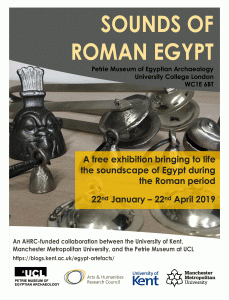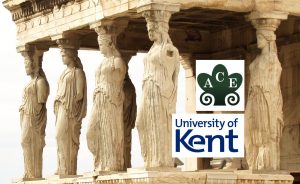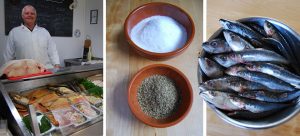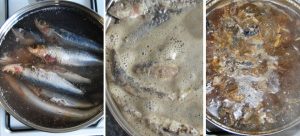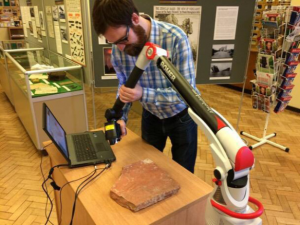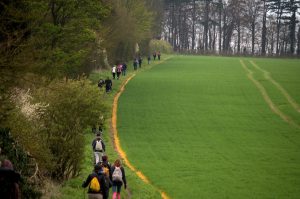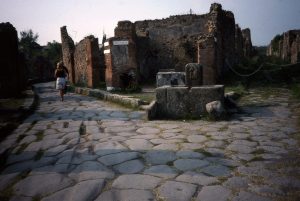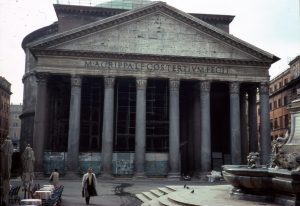We were delighted by the response to our short story competition this year. We received over 100 entries from schools across the country and from pupils in years 7-11. Each entry told a unique story inspired by an artefact from the “Roman and Late Antique Artefacts from Egypt” project. This exciting research brings artefacts from the past back to life – and that’s exactly what our storytellers did after exploring the project’s blog or visiting the ‘Sounds of Roman Egypt’ exhibition at the Petrie Museum, London.
There were so many excellent stories that the panel of judges had a tough job deciding on the winners, but in the end the following stories scooped prizes for their accuracy, originality, and vividness:
1st prize Amani Holden (Forest school) 2nd prize Amelia Mitchell (Roedean) 3rd prizes Emily Ward (Ardingly college) & Madeleine Hodge (Forest school)
Our congratulations to the prize winners and also to everyone who sent in a story. The stories showed just how evocative objects can be when it comes to imagining the past. We hope you’ll all keep exploring the ancient world – there’s so much more to discover!
We’re hoping to run another competition next year so keep an eye out for it. In the meantime, you can enjoy being transported back to ancient Egypt by the story which won first prize (thanks to Amani for allowing us to publish it):
The Panpipes of the Night by Amani Holden (Winner of the University of Kent CLAS Short story competition 2019)
The day had been hot and busy, the market teeming with people, the golden sand swirling through the streets and the Nile rushing forth as always. Ana had spent the day cowering from the heat, sitting indoors and weaving with her mother; thinking. There was a lot of time for thinking in the quiet house. It was a while away from the hubbub of the village, but close enough to the banks of the Nile to hear its rushing waters. How she longed for the cool waters, she had never felt right in the village. She thought about the yarn she wove with her friends, her future, and her strange recurring dream, and how even in the blazing heat, she shivered.
When the sweltering day came to a close, and the deep blanket of night began to smother the sky, Ana curled up on the mat, still thinking. And as the night darkened and the sky was pierced with stars, Ana lay awake restless from her curiosity. She battled with sleep, but her eyelids were sinking by the minute…
The eerie moan of the panpipes snaked through the still Egyptian night. The sounds was mournful and yet somehow beautiful, but quiet as if played through a veil. Ana woke with a start, but the town was silent. Who was the player of the pipes, so skilled but anonymous? And why when she woke, did he cease to play? Was it really just a dream? With these questions running around her head, she fell back into an uneasy sleep, the endless notes playing in her dreams.
The morning came, hazy in the heat. Ana stumbled out of bed, sleep in her eyes. The night’s mysteries came flooding back to her. She grabbed her flask of water and a knife – the market could be a nasty place for a girl, alone. She headed out, unsure of where she was going. She let her thoughts and feet wander, and daydreamed aimlessly.
Her legs carried her there naturally, to the bustle and shouts of the marketplace, and the chorus of voices brought her back to the present. She looked around her. Shouting stall holders, whispering women and the rumble of voices filled the air. Stalls of food, jewellery, clothing, fabric, stones and…. panpipes. She rushed over. But the stall was deserted and still, as if an invisible bubble of calm had enveloped it. The panpipes lay in rows, large and small all covered in a thin blanket of sand, untouched. Her hand was immediately drawn to one small and elegant and jet black. She looked around, but still no one was there, so she left money on the counter and took the pipes.
Determined now to hear her purchase she pushed her way through the crowds and headed for the open desert. Soon she was free from the swarm and by her favourite spot next to the river. As she lifted the pipes to her lips and blew, the sky went dark and all was silent for a while. Silent until she heard an answering call, like an echo in the night. The hour of the panpipes had arrived….
Sand swirled around her rising into a huge cloud, snaking up in a golden band to the heavens. Her headscarf came loose, and her hair rippled about her head in raven waves. She felt free and refreshed, like her whole life she had held her breath, and now she could finally breathe. The sand storming about her seemed like a dream, all around her but she felt nothing. When the note began to die, the sand came falling back to earth. A shining mist of sand covered her entirely, and as the sun rose in the sky, it caught the gleam of her cloak, and any who saw her thought she was a goddess of the desert standing erect and still by the rushing river.
Ana felt a heavy hand clamp around her mouth, and before she could protest, she felt her legs leave the floor and then a sense of falling. Her stomach rose to her throat and her eyes strained in the sudden darkness. Then fear took her and she fell into an even deeper blackness. Down, down, down…
When she awoke it took her a while to adjust to her surroundings. She was in a sort of tavern, dimly lit by wavering torches. Her head swam as she tried to remember what had happened. “Panpipes…” she whispered coarsely, but to her relief they were still there, her hand clutched them and her knuckles were white Her heart rate eased slightly. Propping herself up onto her elbows she tried in vain to locate herself. Nothing came to her. She passed a hand over her eyes. Where was she and how long had she lay there. By the burning cramp in her legs, she guessed about a day. She needed water and instinct made her rise.
“She has awoken.” A booming voice behind her stopped Ana in her tracks. Her hand flitted to her waist, searching for her knife. It had gone. Panic struck her. Slowly she turned, squaring her shoulders. “Who are you? What do you want?” She tried to sound confident, but her voice shook and ended in a whisper. The man laughed, but his laugh was warm, “Ah, a feisty one, ready to fight, well your majesty, I am sorry to rouse you from your sleep. I am Gamal, and as I was saying, I want nothing from you, just your trust.” He bowed low. “What?” Ana looked at him searchingly. “What sort of trick is this?” The man paused, then said “I’m not sure if I’m the one to tell you but…you are the lost princess of the night panpipes, Ana Lileh. And you have come to take up your post and begin a new era. The age of the panpipes.” Ana stared at him steadily, then, feeling a burst of strength, blew a note, pure and strong.

